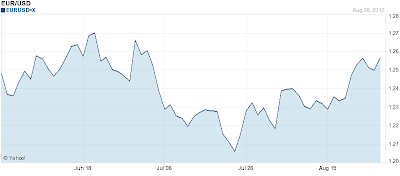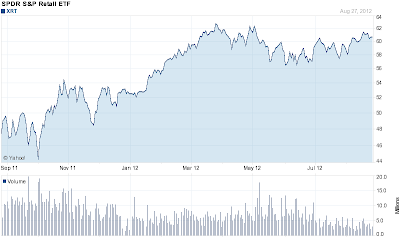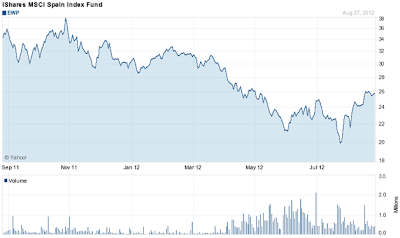International news was dramatic enough this morning to send global markets into tailspin, but Fed hope and relatively impotent U.S. economic data (so far this morning) offer enough drugs to keep nerves calm. China is burning, Europe is confused and the global economy is definitely heading in the wrong direction. Yet, the SPDR S&P 500 (NYSE: SPY) could meander through it all as the S&P 500 Index seems to have a hold on the water line this morning. The SPDR Dow Jones Industrials (NYSE: DIA) and the PowerShares QQQ (Nasdaq: QQQ) are having a tougher time of it today given the troubles at Dell (Nasdaq: DELL) and
Hewlett-Packard
(NYSE: HPQ).
Our founder earned clients a 23% average annual return over five years as a stock analyst on Wall Street. "The Greek" has written for institutional newsletters, Businessweek, Real Money, Seeking Alpha and others, while also appearing across TV and radio. While writing for Wall Street Greek, Mr. Kaminis presciently warned of the financial crisis.
Overseas Drivers
Asian shares are mostly higher today, though Europe is in the red. Asia is most likely reacting to the U.S. Federal Reserve FOMC meeting minutes released Wednesday afternoon. The report was perceived as supportive of a September action by the Fed. Asian shares are buying into the myth that central bank magic can save the global economy, when in fact, all capital leverage evils can be traced to the move from the gold standard a half century ago and more recently to Alan Greenspan’s low rate policies, in my humble opinion.
The tangible news out of Asia was not good though. A survey of purchasing managers published by HSBC (NYSE: HBC) showed deterioration in the nation’s great manufacturing sector. The preliminary index reading for August marked decline to a point of 47.8, down from 49.3 in July. Need I point out that a reading short of 50 marks economic contraction for the sector? Yet, the stocks rise on central bank hopes. This can’t last.
In Europe, Greece is word today, as the German chancellor prepares to meet with the Greek prime minister Friday. The word is that Greece will request more time and more money from the German head of the Medusa we call the European Union (EU). Much of the week’s trading has been around rumor and reality about this subject. Today, the German finance minister said more time and more money will not solve Greece’s problems, and so European shares bleed red. The Vanguard MSCI Europe ETF (NYSE: VGK) managed to resurface yesterday after diving early, but faces a tough trial again today; likewise for the iShares MSCI Germany Index (NYSE: EWG).
International Markets
|
EUROPE
|
ASIA
|
|
EURO STOXX 50: -0.7%
|
S&P/ASX 200: +0.2%
|
|
FTSE 100: +0.2%
|
Nikkei 225: +0.5%
|
|
German DAX: -0.5%
|
Hang Seng: +1.2%
|
|
CAC 40: -0.6%
|
Shanghai Shenzhen CSI 300: +0.3%
|
U.S. Economic Drivers
Weekly Jobless Claims for the week ending August 18 rose by 4,000 to 372K. The four-week moving average for claims increased by 3,750 for the same period. Insured unemployment stuck at 2.6% in the August 11 period, as the number increased by 4,000. The number of Americans covered under all programs decreased by 109,812, to fall to 5.6 million. I hope by now, readers understand that long-term unemployed Americans keep falling out of the workforce after their 99 weeks of benefits run out. A few weeks ago, I authored “
Sell Stocks on Wednesday Afternoons,” an article anticipating the fateful day when weekly jobless claims once again reach 400K. It’s inevitable in my view, and will move stocks on some fateful Thursday. Stock futures started lower immediately after the 8:30 release this morning, but have a chance to hold ground.
The
Markit Flash U.S. Manufacturing PMI Index, reported at 9:00 AM EDT, rose slightly in August to 51.9, from 51.4 in July. It’s a mark that indicates expansion and improvement, but it’s also the third lowest reading in 35 months and indicates a soft environment on an absolute basis. The New Orders Index gained to 52.4 from 51.7. Despite my own pessimistic view, the data offers some support for economists and strategists in denial and blind to global happenings and domestic dullness.
The consumer mood has been deteriorating on the trend line, though with points of reported improvement. The weekly
Bloomberg Consumer Comfort Index is one measure that has clearly shown a deteriorating trend over recent weeks. Recent lift reported on the University of Michigan measure led me to pen, “
Regarding the Consumer Sentiment Celebration – I'll Pass.” The consumer offers the
key ingredient for recession, and I’ve argued it has now been added to the economic stew.
Yesterday’s Existing Home Sales growth, with the annual pace of sales up 2.3% to 4.47 million in July, is followed by
New Home Sales data at 10:00 AM EDT today. Economists expect the annual pace of new home sales to rise for July to 362K, an increase from 350K in June. The range of views extends from 340K all the way up to 400K though. Toll Brothers (NYSE: TOL) lifted the housing industry yesterday with its earnings support, leaving the industry vulnerable to a soft data point though ready for
more good news.
Adding to the real estate data flow of the day, the FHFA offers up its monthly
House Price Index at 10:00 AM EDT. The index showed prices rose about 0.8% in May. Economists surveyed by Bloomberg see a 0.6% increase for June, with the range of views extending from 0.3% to 0.7%. Yesterday, I theorized that rising home prices and maybe even
rising mortgage rates might help housing by scaring homebuyers into action. However, I’m not crazy enough to really believe it’s a good idea, so keep reading.
Yesterday’s Petroleum Status Report showed a 5.4 million draw from oil inventory and a 1.0 million barrel draw from total motor gasoline stocks. That helped oil prices higher, and the iPath S&P GSCI Crude Oil TR Index (NYSE: OIL) gained 0.7% on the day. Today’s
Natural Gas Report is set for release at 10:30 AM EDT. Last week’s report showed natural gas stores increased by 20 Bcf in the period ending August 10 to a level 363 Bcf above the five-year average.
Corporate Drivers
Shares of
Big Lots (NYSE: BIG) are 18% lower in early trading Thursday, after the company reported results short of Wall Street expectations and cut forward guidance as well. BIG produced EPS of $0.36 from continuing operations, versus the analysts’ consensus estimate of $0.41. Its fiscal 2012 guidance for $2.80 to $2.95 was also below its previous forecast for $3.25 to $3.40. The company attributed the loss to cost issues and its Canadian operations.
The
EPS schedule for the day highlights news from Autodesk (Nasdaq: ADSK), Big Lots (NYSE: BIG), Salesforce.com (NYSE: CRM), Patterson Companies (Nasdaq: PDCO), Hormel Foods (NYSE: HRL), Aruba Networks (Nasdaq: ARUN), 1-800-Flowers.com (Nasdaq: FLWS), bebe stores (Nasdaq: BEBE), Bona Film Group (Nasdaq: BONA), China Nepstar Chain Drugstore (NYSE: NPD), Fred’s (Nasdaq: FRED), GigaMedia (Nasdaq: GIGM), Global Sources (Nasdaq: GSOL), Golar LNG (Nasdaq: GMLP), Jinkosolar (NYSE: JKS), Lancaster Colony (Nasdaq: LANC), Mentor Graphics (Nasdaq: MENT), Michael’s Stores (NYSE: MIK), MICROS Systems (Nasdaq: MCRS), Navios Maritime (NYSE: NM), Net 1 UEPS Technologies (Nasdaq: UEPS), Paragon Shipping (Nasdaq: PRGN), QAD Inc. (Nasdaq: QADB), Regis (NYSE: RGS), rue21 (NYSE: RUE), School Specialty (Nasdaq: SCHS), Shiloh Industries (Nasdaq: SHLO), Shoe Carnival (Nasdaq: SCVL), Signet Jewelers (NYSE: SIG), Solera (NYSE: SLH), The9Ltd (Nasdaq: NCTY), Toro (NYSE: TTC), Urologix (Nasdaq: ULGX), Versant (Nasdaq: VSNT), Zygo (Nasdaq: ZIGO) and more.
If you would like to receive this report daily, subscribe to our blog via the banner link below here.
Please see our disclosures at the Wall Street Greek website and author bio pages found there. This article and website in no way offers or represents financial or investment advice. Information is provided for entertainment purposes only.

Labels: Market-Outlook, Market-Outlook-2012-Q3, Wall-Street-Preview





































